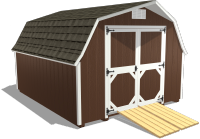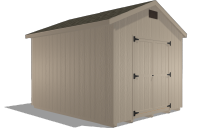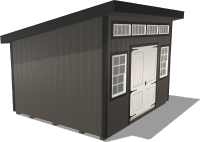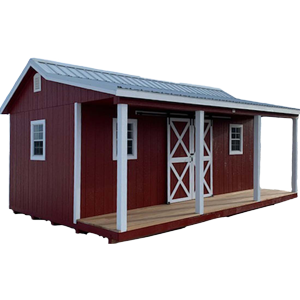Why Choose A Free Range Chicken Coop For Pasture-Raised Chickens?
by Dakota Storage Buildings, on June 07, 2024

If you have kept your chickens in an enclosed coop but now have ample yard space, the idea of transitioning to a free range chicken house might seem appealing and slightly daunting. You may question how you can keep your flock safe and wonder about the logistics of this change. The advantages of allowing your chickens to roam freely are extensive. From enhancing their overall well-being to significantly improving the quality of their eggs, free range conditions mimic the natural living conditions of chickens, offering them the freedom to explore, forage, and engage in instinctual behaviors.
We want to explain what a free range coop entails, explore the tangible benefits of pasture-raised chickens, and provide you with the knowledge to create a thriving outdoor haven for your chickens. With the right approach, your move to free range chicken coops will not only lead to happier, healthier chickens but also contribute to a more sustainable and joy-filled backyard farming experience.
The Fundamentals of Free Range Coops
A free range coop allows chickens to roam outdoors safely and without restriction, while also providing shelter and protection when it is needed. A free range coop represents a significant shift from traditional chicken-keeping practices, prioritizing the welfare and natural behaviors of chickens by allowing them the freedom to roam, explore, and forage outside of confinement. While the term "free range" might not have an official definition within the U.S., it broadly implies that chickens are granted access to the outdoors, enabling them to live in a more natural and enriching environment. This general idea is embraced with varying degrees of commitment, from minimal outdoor access to more expansive, pasture settings where chickens can fully express their instinctual behaviors.
The Humane Farm Animal Care's (HFAC) Certified Humane® program sets a more specific and rigorous standard for what constitutes free range conditions. Under their guidelines, each chicken must be provided with at least 2 square feet of outdoor space, ensuring that birds are given access to the outdoors and that this access offers genuine space to move, forage, and socialize. This standard mandates that chickens must be allowed outside for a minimum of six hours each day, weather permitting, which helps ensure that the outdoor access provided is meaningful and beneficial to the chickens' overall health and happiness.
These standards aim to create an environment that closely mirrors the natural living conditions of wild chickens, fostering a habitat where they can dust bathe, scratch, and have diverse diets by foraging for insects, seeds, and greenery. These conditions not only improve the welfare and satisfaction of the chickens but also help produce higher-quality eggs and meat. Adopting a free range model for raising chickens requires thoughtful consideration and planning to ensure the safety and health of the flock.
Why Go Free Range? The Benefits for Chickens and Their Eggs
The transition to a free range environment offers numerous benefits that go beyond the basic welfare to positively impact their health, the quality of their produce, and the environment.

Enhanced Well-Being
Chickens in a free range environment experience a level of welfare that is significantly higher than those kept in confined spaces. The freedom to engage in instinctual behaviors such as scratching, foraging, and dust bathing is essential for their physical and mental health. This freedom drastically reduces stress and aggression among the flock, as chickens have ample space to exercise, explore, and socialize. The open environment mimics their natural habitat, allowing them to live more peacefully and display a wider range of natural behavior.
Improved Health
There are numerous health benefits for chickens raised in pasture settings. Regular sunlight exposure is vital, not just for vitamin D, which is crucial for their bone health and overall vitality, but also for regulating their circadian rhythms, which can improve their immune response and overall well-being. The varied terrain and environment offer a natural way to control pests and parasites, reducing the birds' exposure to these health risks. Plus, the ability to forage for a natural diet results in a stronger, healthier flock with better disease resistance and less reliance on antibiotics.
Higher-Quality Eggs
Eggs produced by pasture-raised chickens are often superior in taste and nutritional content compared to those from chickens raised in confined conditions. The chickens’ access to a diverse diet contributes to eggs that are not only richer in flavor but also boast a higher nutritional profile, including increased levels of omega-3 fatty acids, vitamin D, vitamin A, beta-carotene, and vitamin E. This can be attributed to the natural foraging behavior of free range chickens, which consume a healthier and more varied diet than those fed solely on commercial feed. The lower stress levels and improved health of pasture-raised chickens tend to increase egg production, making it a win-win situation for both the chickens and those who enjoy their eggs.
3 Strategies for Safe and Healthy Chickens
Creating an environment that ensures the safety and happiness of your chickens involves more than just letting them roam free; it requires a thoughtful setup and ongoing management.
1. Protect Your Flock With Chicken Wire

Adding a protective barrier, like chicken wire, around your property is a fundamental step. It provides a barricade against predators such as foxes, raccoons, and birds of prey. This protection allows your chickens to explore, forage, and dust-bathe in your yard without the constant threat of attack, contributing significantly to their sense of security and well-being.
2. Enhance Their Health With Plants
Incorporating a variety of plants within their area enhances the aesthetic appeal of your space and enriches the chickens' diet and overall health. From leafy greens like kale and lettuce to herbs such as oregano and thyme, these offer natural sources of nutrition and enrichment. It also encourages natural foraging behavior, which is crucial for their mental and physical health.
3. Deter With Repelling Herbs
Strategically planting repelling herbs around the perimeter of your garden can serve as a natural deterrent to keep chickens away from sensitive areas without the need for physical barriers. Herbs like lavender, mint, and lemongrass keep your chickens at bay and repel pests and insects. This provides a dual-purpose solution that enhances garden health and chicken happiness.
What Makes a Perfect Free Range Chicken Coop?
Selecting the right free range chicken house is crucial for ensuring the health, safety, and happiness of your chickens. A well-designed chicken house provides shelter, protection, and comfort, serving as a secure home base where your chickens can rest, lay eggs, and seek refuge from weather or predators. When choosing a coop for free range chickens, there are several key features to consider that will enhance their quality of life.
|
|
Ventilation: Proper ventilation is essential in a chicken house to maintain fresh air flow and prevent the buildup of ammonia and moisture, which can lead to respiratory issues and disease in chickens. Look for coops with vents or windows that can be opened or closed depending on the weather. Good ventilation also helps regulate the temperature inside the coop, keeping chickens cool during hot weather and reducing moisture in colder months. |
|
Perches: Chickens have an instinct to roost on perches during the night but how much roosting space per chicken should you provide? Having adequate and comfortable perching space is crucial for their well-being. Perches should be positioned at varying heights to accommodate the pecking order and allow all chickens access. They should be made of sturdy materials, such as untreated wood, and be wide enough for chickens to comfortably grip without causing foot strain. |
|
|
Nesting Boxes: Nesting boxes offer a safe and secluded space for hens to lay their eggs. There should be at least one nesting box for every three to four hens, lined with soft bedding such as straw or wood shavings. The boxes should be easy to access for egg collection and cleaning but placed in a quiet, dim area of the coop to provide privacy and encourage egg-laying. |
|
Size: How much space does a chicken need? The size of the chicken house is critical, especially for free range chickens that might spend a significant portion of their day outside but need ample space inside to sleep, eat, and take shelter. As a general rule, provide a minimum of 2 to 4 square feet of coop floor space per chicken, but more space is always better to prevent overcrowding, reduce stress, and minimize pecking disputes. |
Embrace Free Range Practices for Happier Chickens
Allowing your flock to be free range not only elevates the standard of living for your chickens, allowing them to exhibit natural behaviors and enjoy a richer, more fulfilling life, but it also reaps a multitude of benefits for you as a keeper. From collecting richer, tastier eggs to the joy of watching your flock thrive in a natural setting, the shift towards free range practices marks a significant step toward a more sustainable farming practice. As you start on or continue your chicken-raising journey, our comprehensive guide, "Evaluating the Best-Fit Quality Chicken Coops," can be a helpful resource. Packed with essential insights, practical advice, and innovative tips, this free guide is designed to support cultivating a thriving, happy backyard flock. Download the guide today.


























